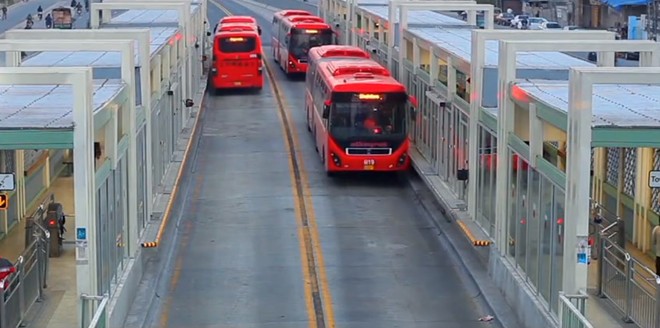
Mega development projects and housing schemes are fast encroaching upon the green spaces and, hence, damaging the environment. Is there a solution?

Our leaders and policy makers’ infatuation with mega development projects is known. And what is equally noticed is their disregard or ignorance about the environmental costs involved. That is why doubts are cast over the Environment Impact Assessment (EIA) of a construction project, such as a road or an overhead bridge, etc.
Be it the Lahore Metro Bus Service, Islamabad Metro Bus Service, or the Orange Line Metro Train project, environmental experts and activists are not satisfied by the steps taken to ensure that environment is not damaged. They have termed as inadequate steps proposed for controlling air pollution during the construction of the Orange Line Metro Train in the environment impact assessment (EIA) report.
The construction of Lahore Orange Line Metro Train Project is likely to cause cutting down of 620 trees on its 27.1km long route from Dera Gujran to Ali Town. The Lahore Development Authority has said it would ensure planting of 6,200 new saplings in place of the felled ones at various spots of the route and its surroundings, according to the Environment Impact Assessment (EIA) report made by the LDA and National Engineering Services Pakistan (Nespak).
In the same way, news reports say EIA report for a portion of the planned Karachi-Lahore Motorway, a part of the Pakistan-China Economic Corridor, was criticised when the people did not show their trust in the EIA during the public hearing for the Rs260 billion 301-kilometre Hyderabad-Sukkur section of the motorway, terming it as lacking authenticity.
Does that mean that the ministry of climate change is not completely aware of the situation? Federal Minister for Climate Change, Senator Mushahidullah Khan, the others day insisted on the government departments to devise projects which ensure clean development and make economic growth environmental-friendly.
Being a signatory to the United Nations Framework Convention on Climate Change (UNFCCC) and Kyoto Protocol, Pakistan is eligible for international technical and financial assistance under the CDM to fund federal and provincial projects in different socio-economic sectors, which can boost environmental-friendly development.
International organisations on the conservation of nature, such as the WWF-Pakistan, have also urged the government to integrate climate change considerations into development plans, in the wake of heatwave which has claimed the lives of over 1,000 people across Sindh, of which 950 deaths have been reported in Karachi.
According to experts, the limited number of parks and green belts in big cities like Karachi and Lahore, for instance, can also be attributed to the current rise in temperatures. These green belts improve the microclimate of an area and lowers temperature. The increased concrete cover, which absorbs and releases heat has led to higher temperatures.
New developmental projects and housing schemes, a never-ending trend in Lahore and Karachi, are encroaching upon green spaces and forests and their subsequent deforestation will not just increase Greenhouse Gas Emissions (GHGs) but also temperatures and our vulnerability to extreme weathering events.